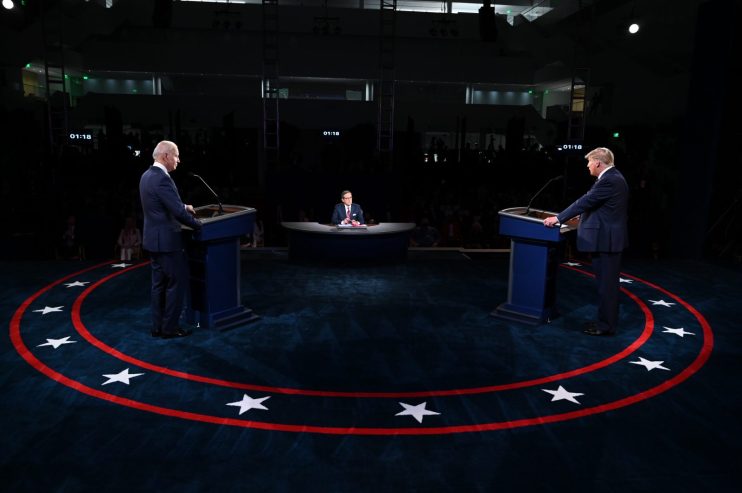The biggest loser in the US election: The idea of the loyal opposition

Edward R. Murrow, the greatest of all American newsmen, got it exactly right about the essence of the miracle of American political stability: “We must not confuse dissent with disloyalty. When the loyal opposition dies, I think the soul of America dies with it.”
Before our very eyes, the aftermath of the election of 2020 shows us that this is precisely what is happening. The absence of a loyal opposition now poses the greatest single political risk to the most powerful country in the world.
The loyal opposition — that is, the cultural tradition by which non-governing parties and their supporters criticise and oppose the actions of the sitting government while it is acknowledged by all that they remain fiercely loyal to the country itself — is the secret sauce explaining America’s remarkable record of political stability. While the French have had five Republics, the US has had but one.
Consider 1960 and the Kennedy-Nixon election, the closest presidential contest in a century, decided by JFK’s popular vote win of 110,000 votes out of 68m cast. It was rumoured that the Democratic political machine was up to nefarious tricks, with dead men voting in Mayor Daley’s Chicago, and Lyndon Johnson cooking the books in Texas.
Word of this reached an anguished Richard Nixon on election night, with many of his staff urging him to contest this seemingly unfair result.
But Nixon, his back to the wall and career seemingly hanging by a thread, fell in line with the miracle of the American political tradition. While privately telling his aides that the rumours could well be true, he resolutely refused to contest the vote and told his followers that he would not put the country through the trauma of delegitimising an election result.
In the end, for all the chicanery, Nixon believed his Democratic challengers had ultimately been a loyal opposition in the 1950s, and that, whatever their differences, he and the Kennedy Democrats were ultimately on the same side.
The tragedy of the 2020 election is that the traditions and norms which have blessed the American people with political stability for over 200 years are being ripped apart before our very eyes.
Both sides have entirely real grievances. Republicans snort with derision at President-elect Biden’s pleas for unity, noting the irony that the Democrats request a loyal opposition after they have just won an election, given that this is precisely what Democrats have failed to be throughout the course of Donald Trump’s stormy term.
And, beyond the obvious ugliness of Trump’s personality, Republicans surely have a point. The outgoing Obama administration did spy on the incoming Trump team, on the justification of false opposition research data that had been bought and paid for (secretly) by Hillary Clinton’s campaign. For the next three years, Democrats obstructed Trump’s efforts to govern, charging first Russian collusion, and then crimes committed over Ukraine.
As to the first, the Mueller investigation into Russian interference did not find enough evidence to charge anyone with a material crime. In the case of the second, what was seen by a majority of Americans as politicising a policy difference (the release of military aid to Ukraine) led to the President’s humiliating impeachment, but not to his conviction by the Senate.
There was a genuine case for concerns about Ukraine and whether the President was pressuring a foreign government to help him politically by digging up dirt on Joe Biden’s son. But the Republicans are not wrong to think that the well-spring for much of this extreme animus sprung not from anything Trump actually did but from the gigantic shock the Democrats experienced in losing the presidential election of 2016 — a result that, all facts to the contrary, they never accepted as legitimate.
In 2016, Clinton herself did not seem to accept that Trump voters were a loyal opposition. During the campaign she mocked his supporters as “deplorables”, implying that something was intrinsically wrong with them for backing anyone but her, that they were morally somehow less than true Americans. I think the poison began here.
Trump, surely the worst sport in modern political history, has taken this idea of delegitimisation to a new and highly dangerous level. The outgoing President’s court case strategy is not designed to win the election — the White House knows it will not change the results, with Biden ahead by tens of thousands of votes in all five of the contested states. Rather, in his narcissistic rage, Trump intends to delegitimise his loss, transforming Biden into an illegitimate President of only half the country.
Horrifyingly, polling suggests that this diabolical strategy is working. While a 2017 study by the Brennan Center for Justice found that the national average of election fraud is a minuscule 0.0009 per cent, Republicans, goaded on by an incandescent Trump, currently think differently. A Politico survey from 9 November found that an astonishing 70 per cent of Republicans do not believe that the 2020 presidential election was free or fair; fully 90 per cent of Democrats believe that it was.
These two narratives are not just different, as is often the case in American politics; they are utterly contradictory.
Political legitimacy, the notion that the other party is misguided but is still decently American and that we are all on the same side, is a fragile notion. It took over 200 years to painstakingly build; it is now being destroyed before our eyes.
I make this practical plea to Donald Trump: there is talk you want to run again in 2024, to mount the greatest political comeback in the GOP since Richard Nixon. If you want to be Nixon, you have to act like him — and put the country first now.
Main image credit: Getty